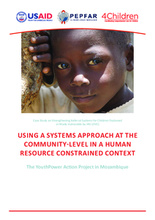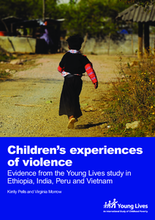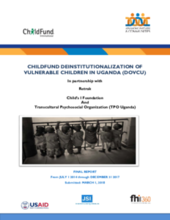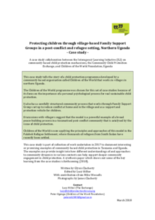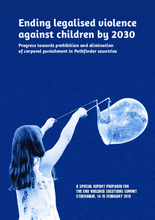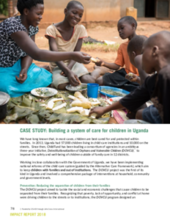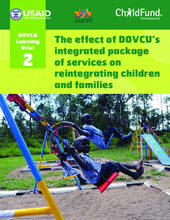Displaying 151 - 160 of 416
This case study is one in a series of case studies highlighting different aspects of a case management system and referral mechanisms utilized by OVC programs. The case study presents a program in Mozambique that could be identified as a hub and spoke model of referral mechanism.
In this summative report from Young Lives, an international study of childhood poverty, authors Kirrily Pells and Virginia Morrow highlight the study’s key findings on violence affecting children, exploring what children say about violence, how it affects them, and the key themes that emerge from a systematic analysis of the children’s accounts from study countries of Ethiopia, India, Peru and Vietnam.
This final report on the “Deinstitutionalization of Vulnerable Children in Uganda” (DOVCU) project identifies its successes as well as some shortcomings and key learning that is directly relevant to other projects working to support family care for children.
This case study tells the story of a child protection programme developed by a community-based organisation called Children of the World that works in villages in northern Uganda.
Prepared for the Agenda 2030 for Children: End Violence Solutions Summit, held in Stockholm, Sweden, on 14-15 February 2018, this report tracks progress towards prohibition and elimination of corporal punishment of children in Pathfinding countries.
This case study from ChildFund's 2018 Impact Report describes the Deinstitutionalization of Orphans and Vulnerable Children (DOVCU) initiative in Uganda, which aims to to improve the safety and well-being of children outside of family care.
Catalyzing Business Skills is a suite of three financial literacy and business skills curricula developed by Making Cents International and Child Fund's Economic Strengthening to Keep and Reintegrate Children into Families (ESFAM) project in Uganda.
These Standard Operating Procedures (SOPs) have been developed based on current, evidence-based practices to facilitate joint action by all health actors to effectively respond to child sexual violence in Kenya.
Reframing Early Childhood Development and Learning is a communications toolkit for building public support in Kenya for better child development policies and programmes.
This learning brief analyzes quantitative data from the second of the “Deinstitutionalization of Orphans and Vulnerable Children in Uganda” (DOVCU) project’s stated objectives: examining the extent to which DOVCU project interventions decrease vulnerabilities for reintegrating children and their families.

